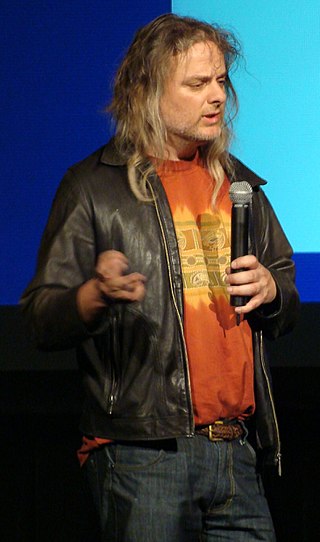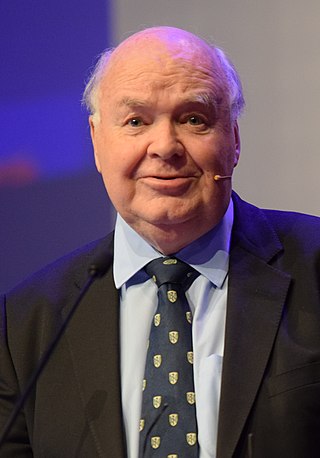Related Research Articles

David John Chalmers is an Australian philosopher and cognitive scientist specializing in the areas of philosophy of mind and philosophy of language. He is a professor of philosophy and neural science at New York University, as well as co-director of NYU's Center for Mind, Brain and Consciousness. In 2006, he was elected a Fellow of the Australian Academy of the Humanities. In 2013, he was elected a Fellow of the American Academy of Arts & Sciences.
Sir Anthony John Patrick Kenny is a British philosopher whose interests lie in the philosophy of mind, ancient and scholastic philosophy, the philosophy of religion, and the philosophy of Wittgenstein of whose literary estate he is an executor. With Peter Geach, he has made a significant contribution to analytical Thomism, a movement whose aim is to present the thought of St. Thomas Aquinas in the style of analytic philosophy. He is a former president of the British Academy and the Royal Institute of Philosophy.

John Randolph Lucas was a British philosopher.

Simon Blackburn is an English academic philosopher known for his work in metaethics, where he defends quasi-realism, and in the philosophy of language; more recently, he has gained a large general audience from his efforts to popularise philosophy. He has appeared in multiple episodes of the documentary series Closer to Truth. During his long career, he has taught at Oxford University, Cambridge University, and University of North Carolina, Chapel Hill.
Galen John Strawson is a British analytic philosopher and literary critic who works primarily on philosophy of mind, metaphysics, John Locke, David Hume, Immanuel Kant and Friedrich Nietzsche. He has been a consultant editor at The Times Literary Supplement for many years, and a regular book reviewer for The Observer, The Sunday Times, The Independent, the Financial Times and The Guardian. He is the son of philosopher P. F. Strawson. He holds a chair in the Department of Philosophy at the University of Texas, Austin, and taught for many years before that at the University of Reading, City University of New York, and Oxford University.

Philip Stuart Kitcher is a British philosopher who is John Dewey Professor Emeritus of philosophy at Columbia University. He specialises in the philosophy of science, the philosophy of biology, the philosophy of mathematics, the philosophy of literature, and more recently pragmatism.
Quentin Persifor Smith was an American philosopher.

Michał Kazimierz Heller is a Polish professor of philosophy at the Pontifical University of John Paul II in Kraków, Poland, and an adjunct member of the Vatican Observatory staff.

James Henry Fetzer is a professor emeritus of the philosophy of science at the University of Minnesota Duluth, known for promoting conspiracy theories and Holocaust denial. Fetzer has worked on assessing and clarifying the forms and foundations of scientific explanation, probability in science, philosophy of mind, and philosophy of cognitive science, especially artificial intelligence and computer science.

Peter Michael Stephan Hacker is a British philosopher. His principal expertise is in the philosophy of mind, philosophy of language, and philosophical anthropology. He is known for his detailed exegesis and interpretation of the philosophy of Ludwig Wittgenstein, his critique of cognitive neuroscience, and for his comprehensive studies of human nature.
John Stephen Morrill is a British historian and academic who specialises in the political, religious, social, and cultural history of early-modern Britain from 1500 to 1750, especially the English Civil War. He is best known for his scholarship on early modern politics and his unique county studies approach which he developed at Cambridge. Morrill was educated at Trinity College, Oxford, and became a fellow of Selwyn College, Cambridge, in 1975.

Myles Fredric Burnyeat was an English scholar of ancient philosophy.
Clifford Williams is an American professor of Philosophy at Wheaton College, Wheaton, Illinois. He is also Professor Emeritus of Philosophy at Trinity International University, Deerfield, Illinois. Williams graduated from Wheaton College in 1964 and from Indiana University with a Ph.D. in philosophy in 1972. He taught at St. John Fisher College in Rochester, New York from 1968 to 1982 with the exception of one semester at Houghton College. He then taught at Trinity International University from 1982 to 2012, becoming the chair of the philosophy department, with the exception of 1998–1999, where he taught at Wheaton College. He rejoined the faculty of Wheaton College in 2013. Williams is a historian of contemporary hobo culture and a part-time hobo, known in that subculture as "Oats."
Alan James Ryan is a British philosopher. He was Professor of Politics at the University of Oxford. He was also Warden of New College, Oxford, from 1996 to 2009. He retired as Professor Emeritus in September 2015 and lives in Summertown, Oxford.

James Opie Urmson, was a philosopher and classicist who spent most of his professional career at Corpus Christi College, Oxford. He was a prolific author and expert on a number of topics including British analytic/linguistic philosophy, George Berkeley, ethics, and Greek philosophy.

Peter Carruthers is a British-American philosopher and cognitive scientist working primarily in the area of philosophy of mind, though he has also made contributions to philosophy of language and ethics. He is a professor of philosophy at the University of Maryland, College Park, an associate member of Neuroscience and Cognitive Science Program, and a member of the Committee for Philosophy and the Sciences.

John Carson Lennox is a Northern Irish mathematician, bioethicist and Christian apologist. He has written many books on religion, ethics, the relationship between science and faith, and has had numerous public debates with atheists including Richard Dawkins and Christopher Hitchens.

Stephen Gaukroger, is a British/Australian historian of philosophy and science. He is Emeritus Professor of History of Philosophy and History of Science at the University of Sydney.
References
- ↑ "Emeritus Fellows". Archived from the original on 3 October 2011. Retrieved 10 October 2019.
- ↑ Jones, Stephen. "Michael Lockwood talks to Stephen Jones at Tucson II". Archived from the original on 2 June 2002. Retrieved 10 October 2019.
- ↑ "Obituary: Michael John Lockwood". The Times. 10 July 2018.